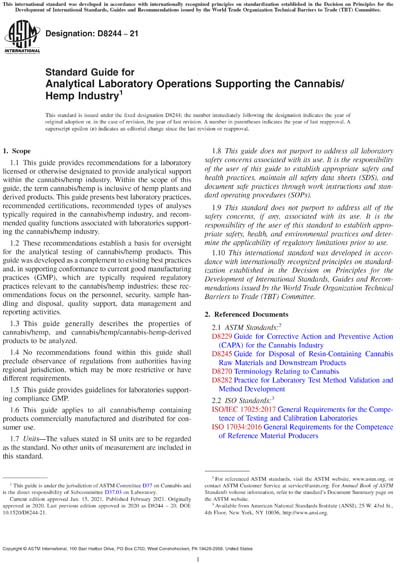Most recent
ASTM D8244-21
Standard Guide for Analytical Laboratory Operations Supporting the Cannabis/Hemp Industry
1.1 This guide provides recommendations for a laboratory licensed or otherwise designated to provide analytical support within the cannabis/hemp industry. Within the scope of this guide, the term cannabis/hemp is inclusive of hemp plants and derived products. This guide presents best laboratory practices, recommended certifications, recommended types of analyses typically required in the cannabis/hemp industry, and recommended quality functions associated with laboratories supporting the cannabis/hemp industry.
1.2 These recommendations establish a basis for oversight for the analytical testing of cannabis/hemp products. This guide was developed as a complement to existing best practices and, in supporting conformance to current good manufacturing practices (GMP), which are typically required regulatory practices relevant to the cannabis/hemp industries; these recommendations focus on the personnel, security, sample handling and disposal, quality support, data management and reporting activities.
1.3 This guide generally describes the properties of cannabis/hemp, and cannabis/hemp/cannabis-hemp-derived products to be analyzed.
1.4 No recommendations found within this guide shall preclude observance of regulations from authorities having regional jurisdiction, which may be more restrictive or have different requirements.
1.5 This guide provides guidelines for laboratories supporting compliance GMP.
1.6 This guide applies to all cannabis/hemp containing products commercially manufactured and distributed for consumer use.
1.7 Units—The values stated in SI units are to be regarded as the standard. No other units of measurement are included in this standard.
1.8 This guide does not purport to address all laboratory safety concerns associated with its use. It is the responsibility of the user of this guide to establish appropriate safety and health practices, maintain all safety data sheets (SDS), and document safe practices through work instructions and standard operating procedures (SOPs).
1.9 This standard does not purport to address all of the safety concerns, if any, associated with its use. It is the responsibility of the user of this standard to establish appropriate safety, health, and environmental practices and determine the applicability of regulatory limitations prior to use.
1.10 This international standard was developed in accordance with internationally recognized principles on standardization established in the Decision on Principles for the Development of International Standards, Guides and Recommendations issued by the World Trade Organization Technical Barriers to Trade (TBT) Committee.
ASTM International [astm]

